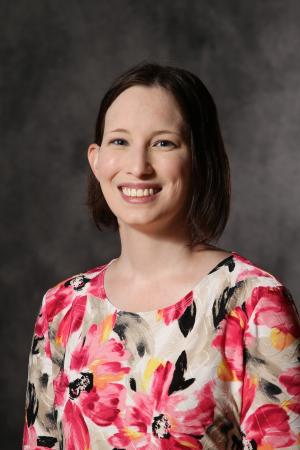As many as one in three LGBTQ+ individuals have been diagnosed with anxiety or depression in the past year, nearly double the number of cisgender, heterosexual individuals.*

Christina Dyar, an assistant professor in the College of Nursing and Provost’s Early Career Scholar, is working to find ways to help reduce these alarming disparities.
By deepening our understanding of how adverse experiences “get under the skin” and contribute to poor health among LGBTQ+ people, Dyar hopes to inform interventions that help lessen health inequalities experienced by this growing population.
Helping a growing population at risk
The percentage of U.S. adults who self-identify as LGBTQ+ has increased to a new high of 7.1%, according to 2021 Gallup data. That percentage had doubled since 2012 when Gallup first measured it. Close to 21%, or one in five, of adult Generation Z Americans — those born between 1997 and 2003 — identify as LGBTQ+, according to the data.
“LGBTQ+ individuals are more likely to have anxiety, depression and problems with substance use than cisgender, heterosexual persons,” noted Dyar. “Many studies have linked experiences of discrimination and microaggressions with these outcomes among LGBTQ+ people; however, these studies have rarely examined how microaggressions contribute to these outcomes in near-real time or what mechanisms may help explain these links.”
In her current research, Dyar examines how these experiences contribute to elevated anxiety, depression, alcohol and cannabis use among LGBTQ+ individuals and how these processes unfold in daily life.
Her study included 429 LGBTQ+ participants who completed two daily surveys about their experiences for a month. Participants responded about occurrences of biased treatment by others, how they attempted to cope with those experiences, their feelings, and their alcohol and cannabis use.
Microaggressions linked to cannabis use and sustaining negative emotions
Dyar found that when an LGBTQ+ person experienced a microaggression, they were more likely to report using cannabis later that day to cope with feelings of anxiety and depression arising from the earlier experience. In turn, using cannabis to cope was associated with engaging in heavier cannabis use and being more likely to experience consequences of cannabis use, such as feeling tired and foggy the next day. Further, Dyar and her research team found that when an LGBTQ+ person experienced a microaggression, they were more likely to report that they felt like they were not able to cope with the resulting negative emotions effectively, were more likely to engage in coping strategies linked with sustaining negative emotions and were less likely to engage in coping strategies linked with decreasing negative emotions.
All three factors contributed to elevated anxiety and depression later that day and into the next. These findings together indicate that microaggressions — which LGBTQ+ people experience in addition to general life stressors — not only contribute directly to elevated feelings of anxiety and depression and cannabis use but also identify potential mechanisms through which this may occur.
How can this help?
“I hope we can develop ways to help LGBTQ+ individuals cope with these experiences,” said Dyar. “The ultimate goal of my research is to inform the development of future interventions that aim to reduce the impact of microaggressions and other stressors arising from bias against LGBTQ+ people. In the long run, societal change is necessary as disparities affecting LGBTQ+ people will continue as long as they are stigmatized.”
Dyar’s findings on alcohol and cannabis use are published in Addictive Behaviors. Her work on coping approaches for negative emotions is in peer review for publication. Co-authors included Debra Kaysen from Stanford University and Michael Newcomb and Brian Mustanski from Northwestern University. Grants from the National Institute of Drug Abuse and the Northwestern University Sexualities Project faculty research award funded her study.
*Kerridge, B. T., Pickering, R. P., Saha, T. D., Ruan, W. J., Chou, S. P., Zhang, H., ... & Hasin, D. S. (2017). Prevalence, sociodemographic correlates and DSM-5 substance use disorders and other psychiatric disorders among sexual minorities in the United States. Drug and alcohol dependence, 170, 82-92.
